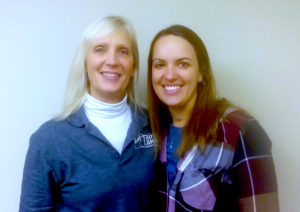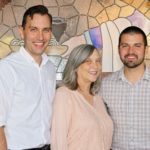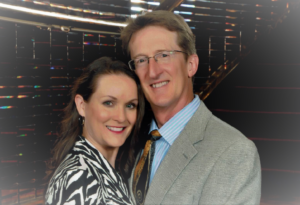Page - Stories
Interested in sharing your story of survival or caregiving after a brain injury?
Want to help spread stories of hope and inspiration?
Jenifer Krischel, Havelock
 “I am a Mom whose daughter had a traumatic brain injury her senior year at Coe College … that is where my journey begins with traumatic brain injury and I would soon realize … it is a forever journey … unlike other injuries where you receive a prognosis and an expected recovery date … our family entered a world of unknowns.
“I am a Mom whose daughter had a traumatic brain injury her senior year at Coe College … that is where my journey begins with traumatic brain injury and I would soon realize … it is a forever journey … unlike other injuries where you receive a prognosis and an expected recovery date … our family entered a world of unknowns.
I would like to share a quote from author, Kara Swanson, who is a brain injury survivor: ‘Course, nobody told me that when they finished pulling me out of my car, they were putting me right on the bus.’
‘That’s what I call the process of recovering from traumatic brain injury: getting on the bus. It’s a good thing they strapped me down and fastened my head to a board. Had I understood even a little of the journey that had just begun, I would have hit the ground running!’
This is for everyone on the bus. It’s about our hard-fought battle. It’s for every survivor who fights that battle every day with courage and strength, frustration and wit, grief and confusion, begrudging acceptance and hopeful determination. It’s for families who seek answers to questions they don’t even know yet to ask. It’s for families, friends and coworkers of survivors who find strangers hidden behind familiar faces.
Thank you … to the people committed to the prevention and treatment of brain injury. The Brain Injury Alliance of Iowa, medical communities, mental health providers, legal professionals, state law makers, counselors, case managers, all of you who offer care, hope, and protection for survivors and their families. You provide guidance and bring desperately needed resources to survivors who find themselves lost in a recovery world they are often ill-equipped or ill-prepared to take on.
To all of you in the trenches each day fighting for people with brain injuries … PLEASE REMAIN committed to POSSIBILITIES in each survivor, NOT PROBABILITIES … ABILITIES IN EACH PERSON you serve … not disabilities.
Thank you from the bottom of my heart … you all make a difference, every day.”
Russell K., Iowa City
“The Brain Injury Alliance of Iowa was key in helping my wife understand what had happened to me after my fall from a ladder. I spent many days in a coma in the intensive care unit on the edge. After I got out of intensive care BIAIA staff helped us understand our insurance and our options for post-acute rehabilitation. We believe this was a critical service in my recovery and return to work”
Aaron Young, Des Moines

The Des Moines Register reporter Aaron Young (right) recently lost his mom, Angela, to a brain injury, and his family received support from the Brain Injury Alliance during their journey. He wrote about his family’s heartbreaking experience here.
Elizabeth B., Bettendorf
“My 35-year-old daughter was in a car crash 10 years ago. She had recovered enough to live in her own apartment with the support of “home and community based services” via the Medicaid program. After nine years of services we were notified that her annual review indicated she no longer qualified for services and supports. We knew that there had been no changes in her abilities but she did have a new case manager. BIAIA was able to help us use a brain injury specific assessment as part of an appeal to the Department of Human Services for continued services, which was granted! Without this support our daughter would be living with us, or in a nursing home.”
Robert W., Des Moines
“My mother knew of the Brain Injury Alliance of Iowa and suggested I contact them when my wife was being discharged from the hospital after a long neurological illness. The hospital social worker had sent me to look at nursing homes for her to move to. My wife is 35 and I was heartbroken at the idea of sending her to a nursing home. BIAIA helped me understand how to advocate with the hospital, and my insurance company for intensive brain injury rehabilitation. My wife came directly home after 4 weeks in that program and was able to re-enter life! She is again the primary caregiver for our children and I am back to work. BIAIA was a lifesaver for our family.”
Chris S.
How do you identify? Both a survivor of a TBI (4/15/2000) and spouse of a survivor (10/24/2019). injury
When did your brain injury occur? Suffered an inner cranial bleed on April 15, 2000.
Tell us about your life prior to brain injury? I had been a teacher for 7 years, speak French fluently and Spanish is ok. Busy, also coached soccer and debate in a high school. Had gotten engaged and was planning a June wedding in 2000. Fit, indestructible.
What did recovery and treatment look like for you after your injury? I was airlifted from Fort Dodge to Methodist in Des Moines, Ia. I spent a month solid in a coma; brief moments of consciousness- then the lights got turned on. Only spoke in Latin, French, Spanish… then English. Took PT class everyday, cognitive therapy, some speech. Methodist has an excellent therapy regime- in class and outside experiential therapy as well. Made it through everyday waiting for my girlfriend(now wife) to arrive.
What roadblocks did you face during your recovery? Not being able to ‘function’ as before. Hard to see the big picture. Stuck on minutiae. Short term memory is still difficult- need to write copious notes and always have a graphic organizer with me- now it’s an iPhone; used to a notebook.
How did you overcome those roadblocks? Always will struggle with some of them. Cannot teach anymore- schools don’t have time to carry teachers who need help; hard enough supporting the students.
Who is your biggest supporter? And how were they important in your recovery? My girlfriend, now wife. Her father. Some good friends who stood by. I lost a few.
Do you currently face challenges? Yes, need small goals. I cannot teach. Got a job in a factory; I drive a fork truck and load trailers.
How do you cope with those challenges? Hurts. I know my expectations; and I try my hardest to fulfill them.
What strengths have surfaced in your life after your brain injury? Necessity makes you courageous. Need to get up; do your tasks.
If you could give advice to other survivors or family members, what would that be? It sucks. Find a support net; may not be family, but people who know you are struggling and can encourage.
Do you have anything else you’d like to add? My best friend, who’s also my wife put up with too much alone. If you know someone in this situation, ask what ways that you can help, relieve a burden. They may get say ‘no’. Don’t push it, but be there for the caregivers, the wife or husband. They need help, but wait for them to express that need.
Mackenzie S.
How do you identify? Individual with a brain injury
When did your brain injury occur? In 2003 due to a car accident.
Tell us about your life prior to brain injury? I was a high school Freshmen struggles with anxiety.
What did recovery and treatment look like for you after your injury? I completed Occupational, Physical, and Speech Therapy both inpatient and patient.
What roadblocks did you face during your recovery? I struggled with emotional regulation and memory.
How did you overcome those roadblocks? I did therapy to assist with my emotional regulation and I found tools to assist me with my memory.
Who is your biggest supporter? And how were they important in your recovery? It is hard to choose one person because my family were my #1 supporters in my recovery. They have continued to always be there for me and my husband also joined the team of supporters
Do you currently face challenges? I do struggle with short-term memory and expressive aphasia.
How do you cope with those challenges? I use an application on my phone that give me reminders of what tasks I need to do or have planned just in case I forget. I educate others that I have aphasia to understand why sometimes I struggle with getting words out correctly.
What strengths have surfaced in your life after your brain injury? I didn’t really know in depth information about my brain injury until after taking the CBIS class. After learning more information, I was able to gain more insight into myself and how writing for me can be more of strengthen then talking. I have worked on developing strengthening my writing along with my speech to better communicate with others. It has also has helped me learn that I love writing and I have a blog that write in about various topics.
If you could give advice to other survivors or family members, what would that be? Embrace who you are and surround yourself with people that support you. If you are struggling to find a support system, sometimes you can find them where you least expect it. That is why it is important to put yourself out there.
Merit
How do you identify Individual with a brain injury
When did your brain injury occur? 2013, 2014, 2015, 2016
Tell us about your life prior to brain injury? I had a career in aerospace earning a great salary and a house, and vehicle with financial security.
What did recovery and treatment look like for you after your injury? I didn’t receive the correct care in 2013, when I was assaulted and blacked out from a dangerous felon who had been released from a 3rd 5-year sentence. I needed assistance with safety and neurological care. I had suffered Cognitive, Speech, and visual problems from the TBI & Multiple Concussions. The criminal located me through public records: police reports. The main criminal who had also raped me stalked me causing me more permanent brain damage. When I arrived to Iowa in late 2016, I had finally started to receive neurological tests, MRIs, speech & cognitive therapies to work on the brain injuries. I suffered a Mid Line Shift also and have chronic headaches still from the injuries. I started to work a part-time job to help me improve from my TBI. I am still working actively on my goals in hopes to return to my former self as a Professional Analyst. I am also working on taking classes online. I have started a local brain injury support group because I have discovered so many other wonderful people who are living with brain injuries and lives have dramatically changed.
How did you overcome those roadblocks? I am motivated to overcome the challenges and to advocate for others because of what I have learned thus far.
Do you currently face challenges? Yes, but will continue to work through them and ask for help if needed.
How do you cope with those challenges? I have started a brain injury support group, meaningful work, family visits, my emotional therapy dog, volunteer, and advocacy.
What strengths have surfaced in your life after your brain injury? I am persistent and have learned that I need to think of myself, so that I don’t shut down and become overwhelmed at things that I believe that I can still do like the former me.
If you could give advice to other survivors or family members, what would that be? If you love and care about the survivors, take the time to read the available resources and information in order to better comprehend what survivors can’t always communicate/articulate to their family, friends, and caregivers. It is hard work and lots of confusion about what survivors deal with.
Doug B.
How do you identify?  As an individual with a brain injury
As an individual with a brain injury
When did your brain injury occur? November 2016 HSV 1 encephalitis (viral) and lobectomy (surgery), January anti-NMDA receptor encephalitis (autoimmune)
Tell us about your life prior to brain injury – I had a very fulfilling life. Personally, married, 4 children at at the time of the brain injury (as I’m told) 4 grandchildren. I have held multiple positions in local public health administration in California, Illinois and Iowa. I had been the director of the Johnson County health depart for 10 years. I was active in local community theater as a performer, choreographer and dancer. (I met my wife in college where we were members of a competitive ballroom dance company and we also competed and performed as a ballroom and showcase dancers). I have been active in my religious affiliations and had leadership positions within my congregation. Faith has been a significant part of my upbringing and was a major factor in the success of my recovery.s ent have a Master’s degree in Public Health Administration
What did recovery and treatment look like for you after your brain injury? I have to rely on what others have told me, what I was able to write down in journals, and pictures I have seen. I have memories of being in physical therapy sessions confused at why simple things were so difficult. I had always been very active and physically fit during my life. Now simple tasks such as sit ups and pushups were almost impossible. I didn’t know I had been laying in hospital beds for weeks. Due to memory loss I was confused yet fascinated by technology. I thought I was in a Star Trek show where you could talk to computers, phones didn’t need cords plugged in to a wall and all sorts of others lights and sounds. I had used these in my “previous” life but the memories were gone and it was confusing yet fascinating.
What roadblocks did you face during your recovery? Myself. I knew I had an advanced degree and was fairly successful in life and was confused why therapists were treating me like a child who was just learning to talk, write and use eating utensils. I used to be the one in charge of large projects and a staff, but now I couldn’t find basic things that should be familiar and couldn’t remember what I had done 10 minutes ago. That wasn’t natural for me and I didn’t want to accept that I needed to use the tools that my therapists were recommending. Simple things like a notebook and pen to write down lists, names, etc.
How did you overcome those roadblocks? I learned to trust those helping me, particularly my wife and other family members who had occasion to visit or talk with me. With practice I found the old comfort of knowing what to do, where to find things, and what I had done when I used the tools given me. It was a matter of acceptance of what I had been through.
Who is your biggest supporter? And how were they important in your recovery? My eternal companion, Jill (my wife). When we got married we made commitments to each other for this life and beyond. She remembered the good things about me and wanted me to regain those abilities and qualities. It’s been challenging for both of us to have such a change in roles but we have needed to focus that we’re not 2 individuals but 1 team.
Do you currently face challenges? Remembering names with faces. I can hear a name and know that I know if but don’t remember how I know that person (theater, work, church, family, ???) Remembering which name goes with which person and which face when I see it.
How do you cope with those challenges? Practice and acceptance. As I great people (even family members) I introduce myself, look them in the eye and wait for them to tell me their name. I may then have to ask them how we know each other. I have been blessed to have known many good people who smile and provide me the background and make me feel comfortable.
What strengths have surfaced in your life after your brain injury? I care about how others are feeling and what they perceive. I have often had the thought that I hope the last interaction I had with someone, anyone, was good because what if it is the last interaction I have with them. Having come so close to dying has helped me to focus on becoming the type of person I should be. I have a long way to go but I hope I am pointed in the right direction and I give it consideration every day in even the smallest of decisions.
If you could give advice to other survivors or family members, what would that be? Celebrate the little victories you have each day. Enjoy each moment and look forward to the next opportunity to do something nice for someone. Figure out what is most important to your relationships and put your energy there. Things that aren’t important should not detract from the core things that make you happy.